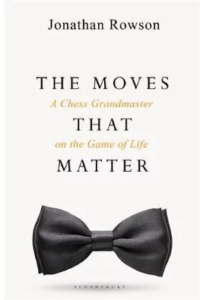Giles Fraser’s next Confessions is with author Jonathan Rowson. Elizabeth gives us a sneak peak of his bestselling book…

I’m not a chess player. I think of the pieces as “the horsey one”, “the tower” and “the cute little ones” and have no idea how they are supposed to move. So I was surprised by how much I enjoyed a book purportedly about chess. The Moves that Matter: A Chess Grandmaster on the Game of Life by Jonathan Rowson is part insight into the life of a professional chess player, part bildungsroman, and part self-help book for those who hate the very idea of the genre.
In 64 vignettes (the number of squares on the board) he reflects on everything from grief to gender, confirmation bias to changing nappies, the nature of evidence to the existence of god, while weaving in a sense of the game’s history, sociology and allure.
His passages on concentration have stayed with me. The etymological root of the word is “bringing fissiparous materials together towards a centre, thereby distilling and purifying substances”. When we concentrate, we are someone distilling down our very selves — bringing the varied parts of our consciousness together. I had never thought of concentrating as “an encounter with the nature of the self”, nor realised how little I want to settle for a dilute, distracted, scattered sense of self.
My battle to keep off Twitter and emails in order to do real work seems now about something deeper and more urgent than mere productivity. We’re all wising up to global corporations which reply for their profitably on buying our attention. This exchange — the giving over of our ability to concentrate in exchange for ease, speed and never-ending entertainment always seemed a bit of a fools bargain, but now seems a truly appalling one. The challenge of the book then, is to find ways of rebelling, seeking concentration on the local, the present, the real as an act of subversion. Rowson equates concentration with liberation:
Whether we find it through chess, prayer, meditation or other contemplative practices, we could all do with a bit more of that.








Join the discussion
Join like minded readers that support our journalism by becoming a paid subscriber
To join the discussion in the comments, become a paid subscriber.
Join like minded readers that support our journalism, read unlimited articles and enjoy other subscriber-only benefits.
SubscribeThis article is so appreciated. I have been teaching chess to children for over 30 years and it is amazing that the game has become even more popular with young people even with the advent of numerous video games currently on the market.
There is something very satisfying about sitting down with a nice wooden chess set and playing over a game played by a grandmaster from the past. It is like reliving history plus chess requires so much focus that the rest of the world, with all its problems, ceases to exist if only for a little while..